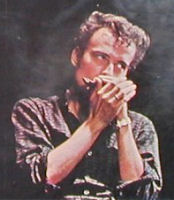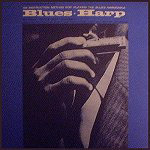2007 Induction of Tony Glover
"Best Blues Literature"
Blues Harp

Tony Glover
Introduction by Brian Dyke
It gives me great personal pleasure to induct to the Minnesota Blues Hall Of Fame, a longtime writer and voice in blues literature, Mr. Tony Glover.
Before I begin, I should first like to extend my warmest and sincerest congratulations to all of the gentlemen being inducted tonight. This recognition is well deserved and long overdue, and it is my great pleasure to be able to be apart of tonight's event. My hope is that tonight's event not only offers our inductees recognition for their achievements, but also serves to further enshrine their legacies within this community that they have so greatly touched.
Although most of us know Mr. Glover primarily as a musician, he is equally as influential as a writer. As an author, instructor, reviewer, and critic, he is respected and admired by both his contemporaries as well as his audience. His articulation and eloquence are equally matched by his passion and commitment to his art.

In 1965, Mr. Glover authored one of the first, if not the first, and most widely circulated books on blues harmonica instruction, the first of a series that would go on to include Rock Harp and the Blues Harp Songbook. Aside from being notable for being one of the first of its kind, it was also immediately apparent that the credible and authoritative approach that was a trademark in his work with Koerner, Ray, And Glover was also applied to his method of instruction. In addition, Mr. Glover's descriptive and imaginative use of language and style fostered an accessibility lost on most instructional texts, and that signature method of writing style remains legendary to this day as his books continue to enjoy the success they so deserve.
As his writing career continued, his words would appear in publications as prestigious as Rolling Stone, Creem, Crawdaddy, and, of course, our very own Twin Cities Blues News and Blues On Stage.
He has gone on to co-author one of the few, if not the only, biographies on Little Walter, Blues With A Feeling, which was published in 2002. Tangential to that, he has cataloged the most extensive and thoroughly researched documentation of Little Walter Recording Sessions in existence.
In 2000, when it finally came time to officially release the infamous 1966 Bob Dylan performance from the Royal Albert Hall, a performance which many scholars regard as the greatest live recording of all time, it was Tony Glover who was commissioned to author the liner notes. For this achievement, he was awarded the highly prestigious ASCAP Deems Taylor award.
He has also written liner notes for seminal blues artists such as John Hammond, Sonny Terry And Brownie McGhee, John Lee Hooker, as well as local legends Willie And The Bees and Lazy Bill Lucas. He wrote the liner notes for all three of the Koerner, Ray, And Glover reissues on Red House Records, and those, folks, are the liner notes against which all other liner notes are measured. And, as I'm sure you'll all agree, good liner notes are something to be savored.
To illustrate how influential Mr. Glover's writing has been, especially for our local blues community, I would now like to offer this quote from one of our favorite local blues harmonica virtuosos, Steve Vonderharr: "In addition to inventing a uniquely creative methodology for playing harmonica, Tony Glover's Blues Harp instructional book exposed the reader to the complexities of a subculture rooted in poverty and oppression, where people with innate musical abilities triumphed over impossibly difficult circumstances to invent an art form that touches the soul of all people. Glover's book accomplished these difficult tasks with equal parts of humor, research, personal experience, street wisdom and a profound respect of history. In addition to being an influential musician himself, Glover displayed an obvious gift for writing that was nurtured by the emergence of the 1960's counter-culture that defied convention in favor of humanism and access for all."
Now, I wish that I could stand here and tell you of all of the ways in which Mr. Glover's writing has been influential on me as a writer and reviewer, but unfortunately I'm committed to a time constraint this evening, and I've already spoken long enough. To briefly summarize, I can state wholeheartedly that I've been overwhelmed by Mr. Glover's creativity, his use of word imagery, and the articulation that he applies to his prose. Most of all, it is the distinguished and definitive voice that is heard behind the words that he writes, much like the immediately recognizable sound and tone of a Mojo Buford harp lick or a Bruce McCabe lyric, that has spoken to me as a writer, as a fan, and as an archivist. I stand before you in all earnestness this evening testifying to the fact that not only has Mr. Glover's contributions to blues literature allowed me to become a better writer, but they have played a great role in allowing me to find my own voice in writing as well.

Brian Dyke
Now, unfortunately, Mr. Glover is unable to be in attendance this evening, but nevertheless, I would now like to ask that you please join me in welcoming our next inductee to the Minnesota Blues Hall of Fame, for outstanding achievement in the field of blues literature, for bringing awareness of blues music and the blues music experience to a greater audience world wide, for his seminal voice, articulation, passion and prestige, our next inductee, Ladies and Gentlemen, Tony Glover.
Thank you very much. And now on with the show.
This Page Last Updated: Tuesday, July 10, 2012

